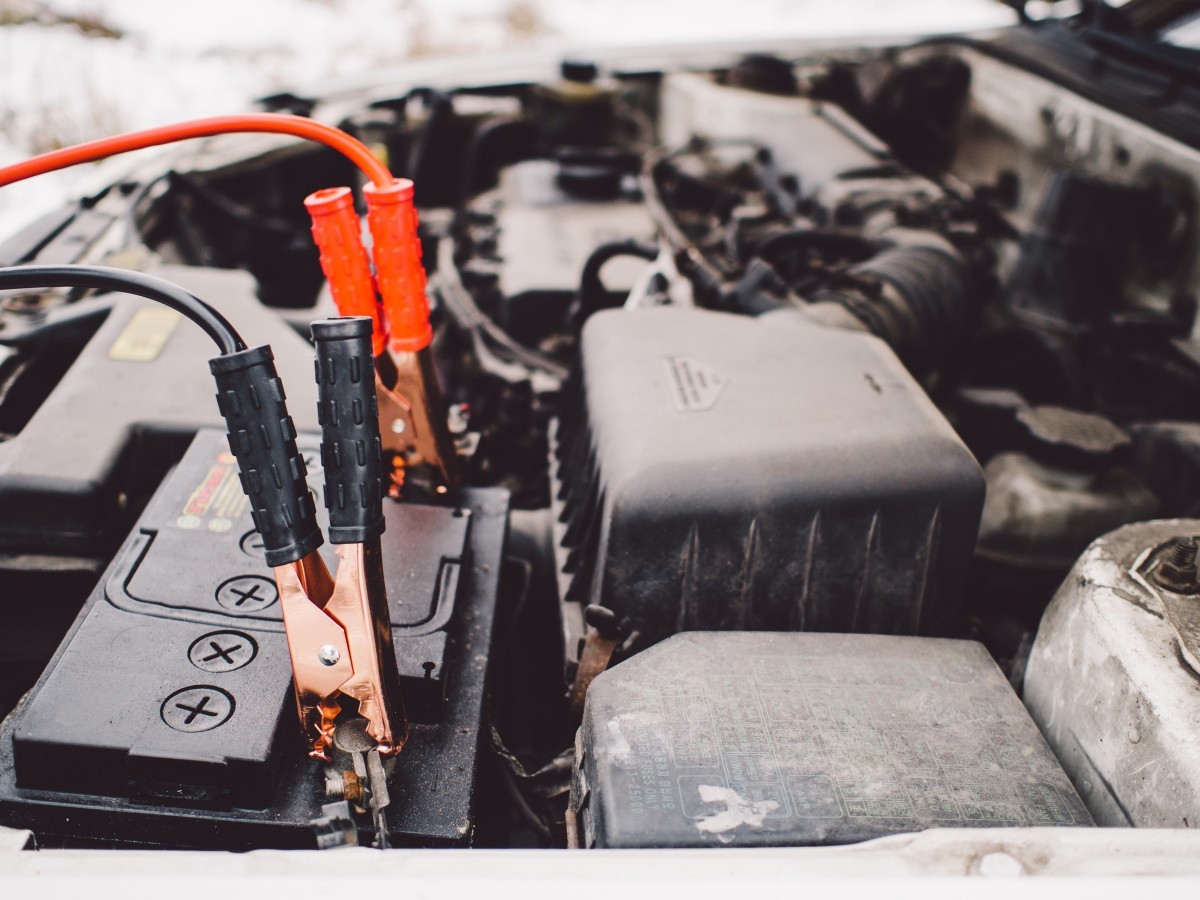Florida, the sunshine state, is famed for its beautiful beaches and warm climate. While residents like Linda McNamara enjoy the constant sunshine, this heat can take a toll on your car, particularly its battery. You might be diligent about your sunscreen, but are you giving your car battery the same consideration in this heat?
 Car with jumper cables on the battery
Car with jumper cables on the battery
The Florida Heat Factor: Why Batteries Fail Sooner
According to AAA, battery service calls surge during hotter periods. This is especially true in southern states like Florida where the intense heat can significantly shorten a car battery’s lifespan, potentially leaving you stranded.
Alan Smith, the general manager at Terry Wynter Auto in Fort Myers, highlights the issue: “The ideal temperature of a battery is 80 degrees. Obviously in Southwest Florida we’re always over 90 it seems like.” This persistent high temperature is the core problem.
Summer in Florida puts immense stress on car batteries. Mechanics are seeing a peak in battery replacements during these months. Just last week, Terry Wynter Auto replaced at least 20 batteries, according to Smith.
“The high heat of the temperature down here robs the battery of its liquids. They evaporate. It weakens the battery,” Smith explains. The heat accelerates the internal chemical reactions within the battery, leading to faster degradation and a reduced lifespan.
Average Car Battery Lifespan in Florida
While a car battery in a cooler climate might last five years or more, in Florida, you can expect a significantly shorter lifespan. AAA estimates the average car battery lifespan in Florida to be around three years, and in some cases, it can be even less. Smith himself has experienced this firsthand, stating he’s had to replace his own car battery twice in just two years.
This drastic reduction is directly attributed to the heat. The extreme temperatures common in Florida act as a catalyst for battery failure, making regular checks and proactive maintenance crucial.
How to Check Your Battery’s Age
Knowing your car battery’s age is the first step in preventing unexpected breakdowns. Most car batteries have a date code that indicates when they were manufactured. Joel de Guzman, Parts Manager, explains how to find this code on AC Delco batteries.
“On the AC Delco batteries there is a stamp on the battery,” de Guzman says. “0-4 that means that was the month that it was made, and nine is 19, the year it was made. So that was made in April 2019.” In this example, “04” represents April (the 4th month), and “9” represents 2019.
It’s important to note that date codes can vary between brands. Some manufacturers use letters to represent months. Consulting the battery brand’s documentation or a quick online search for “[Battery Brand] date code” will help you decipher the code on your specific battery.
Tips to Extend Your Car Battery Life in Florida Heat
While the Florida heat is unavoidable, there are steps you can take to prolong your car battery’s life and avoid premature failure:
- Check and Clean Corrosion: Regularly inspect your battery terminals for corrosion, a white or bluish build-up. Corrosion can impede the flow of electricity. While you can clean it yourself, it’s often safer to have a mechanic do it, as battery acid is corrosive. “If it’s dirty, clean it up. You might get a little bit of extra time out of it depending on how bad the corrosion is,” advises Smith.
- Park in the Shade: Whenever possible, park your car in shaded areas or in a garage. This reduces the battery’s exposure to direct sunlight and high temperatures, helping to keep it cooler.
- Avoid Short Trips: Short trips, especially with accessories like air conditioning running full blast, may not give your battery enough time to fully recharge after starting the engine. Whenever possible, combine errands into longer trips to ensure adequate charging time.
Signs Your Car Battery Might Be Failing
Be alert for warning signs that your car battery is nearing the end of its life. These can include:
- Slow Engine Cranking: If your engine cranks slowly or hesitates before starting, it could indicate a weak battery struggling to provide sufficient power.
- Clicking Sound When Starting: A rapid clicking sound when you turn the key often means the battery doesn’t have enough charge to start the engine.
- Dashboard Warning Light: The battery or check engine light may illuminate on your dashboard. While these lights can indicate other issues, battery problems are a common cause.
If you notice any of these signs, it’s crucial to have your battery tested by a professional mechanic. “We’re testing and changing batteries all day long. It’s almost crazy,” Smith remarks, highlighting the frequency of battery issues, especially in Florida’s climate.
Conclusion
The intense heat in Florida significantly impacts car battery lifespan. While batteries in cooler climates can last for five years or more, Florida drivers should anticipate replacing their batteries every three years, or even sooner. By understanding the effects of heat, checking your battery’s age, practicing preventative maintenance, and being aware of warning signs, you can minimize the risk of battery failure and ensure your car remains reliable, even in the Florida heat. Proactive battery care is key to avoiding being stranded and keeping your vehicle running smoothly year-round in the Sunshine State.